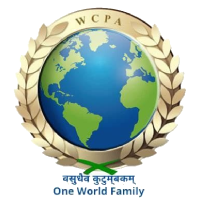The Evolutionary Ascent To World Law
Glen T. Martin
The process of evolution involves the universe becoming evermore conscious of itself through development of multiple levels of sensory awareness from a primitive paramecium to a fully developed human self-consciousness. Primitive life is oriented to its surrounding environment through multiple forms of awareness and evolved responses built into its physiology, such as avoidance of dangers and attraction to sources of security, food, etc. Evolution moves, like human history, to ever-greater complexity and higher degrees of unifying consciousness.
The evolutionary process on our planet is over 3.6 billion years old. It has manifested itself in evermore complex and myriad forms of life exhibiting evermore sophisticated and complex forms of awareness and responsiveness to the surrounding environment. The most complex form of life to evolve was the human form, going back some two million years. It was reduced to only one species, to our homo sapiens form, in the past half-million or so years. Out of the biological evolution of homo sapiens came our ability for continuous cultural and conscious evolution.
As language developed during this latter period, responsiveness to the surrounding environment became less and less physiological and progressively more cultural. Older generations continued to teach younger generations both transmitted and newly acquired knowledge. This knowledge was in turn supplemented by new knowledge discovered by the younger generation and then again transmitted to a new younger generation in an on-going accumulative process without end. We learned and transmitted our learning to subsequent generations. We learned to make tools, to practice agriculture, to build structures, to create art, to read and write, to engineer water systems, to make roads and vehicles to run on them, and to engage in trade of goods and services.
The complex organisms called human beings inherited a multiplicity of desires and instincts from their evolutionary past that could cause internal conflict as well as conflict with the desires and instincts of other persons. Humans evolved as inherently social creatures who needed to operative cooperatively for survival and flourishing and in doing so required the evolution of customs, social rules, and finally laws to help support and enhance their flourishing. As philosopher Errol E. Harris points out, “social progress, though very different in character and in principle from biological evolution, appears as an extension of the same process” (1987, 252).
Contemporary science reveals that the telos behind this evolutionary process lies at the heart of the universe itself that emerged in a seemingly miraculous titanic explosion called the Big Bang. Science tells us that everything in the universe evolves, everything is animated by this telos animating the “law of complexity-consciousness.” Organisms evolve, but so do the ecosystems within which they are embedded and to which they are integral. The geosphere and the biosphere of the Earth have evolved over the 4.6 billion years of our planet’s existence and from this process has emerged the noosphere, the sphere of mind that animates human civilization encompassing our planet. The telos in every case is the same—ever-greater complexity governed by ever-greater universality of laws and principles.
Thus, ever-greater complexity requires ever-greater universality to govern it and make it coherent. With the invention of the automobile, for example, a few cars could drive around the streets without traffic laws. But today millions of cars on complex road systems require governing through universal traffic-law principles, through the enforceable use of traffic lights, stop signs, speed limits, certification of driving skills, etc. The same thing is true of the laws governing communities. The colonial village required few laws, whereas a modern complex city of millions of people requires an elaborate set of laws to coordinate, protect, serve, and enable life by its citizens. Universal, coherent laws and principles are needed to govern complexity.
The modern world evolved out of the 16th and 17th centuries into a system of sovereign nation-states, primarily centered in Europe, claiming possession of colonial empires found largely in Africa, South Asia, and Latin America. However, human consciousness continued to expand, moral principles continued to become more universalized, and colonial rebellions continued to press for sovereign-state “freedom” and independence for these colonies. Even through the late 20th century colonial nations continued to be “freed” to move from a status of dependency on the “mother country” to dependency on the globalized neo-colonial, international economic and political system. The claim of “sovereign independence” has largely proven to be substantially an illusion, but nevertheless remains a major impediment to further universality.
Today, there are nearly 200 nations all retaining complex legal systems that are necessary to the proper functioning of any society. Governance between these nations has evolved something called “international law.” However, there is wide agreement that international law is inadequate because it is not enforceable over sovereign nations and because, by and large, it purports to govern nations as a whole and not individuals. The result is perpetual conflict, wars, and failure to deal with global problems (such as climate collapse or nuclear weapons, see Martin 2021).
Moreover, the consciousness of citizens within sovereign nation-states tends to be conditioned by the situation of sovereignty itself. The telos for universality and coordination operating behind the evolutionary law of complexity-consciousness is blocked by the collective egoism of national entities. National entities condition their citizens to nation-state patriotism. These national entities, therefore, tend to operate in conflict with the fact that the entire world is now inhabited by a complex civilization with multiple economic, political, cultural, and business forces that require the coordination of genuine law to make the system work.
The present world system of “international laws” that are mere treaty-agreements of militarized sovereign nations cannot create peace, nor justice, nor sustainability for the world. A huge world civilization careens toward disaster as each nation or corporation goes its own way, and even those who want to cooperate find themselves blocked by a global economic system of northern supremacy over the global south. The U.N. system, based on national sovereignty and an undemocratic U.N decision-making procedures, cannot deal with this tragic situation.
This is precisely the function of democratic world law under the Constitution for the Federation of Earth (www.earthconstitution.world). What is blocked by the present world system of international law attempting to govern “sovereign” nations that recognize no effective laws above themselves is the evolutionary telos itself, that is, the movement of complexity-consciousness throughout the evolutionary process and throughout human history. All human languages become evermore translatable into one another, and culture has become global as the internet and computers evolve according to the laws of complexity-consciousness (cf. Teilhard de Chardin 1975). But the universal coordinating function of law has not kept pace.
With the development of weapons of mass destruction, bio-terror weapons, and consciousness of an ever-accelerating climate-collapse, the failure of international law to address these threats to human existence and the existence of life on Earth has become evermore apparent. The function of democratic world law under the Earth Constitution provides the necessary and reasonable solution to these crises. World law unites humanity within a single global civilizational framework and protects human diversity as a necessary good that clearly requires proper coordination to flourish.
The most fundamental goal of the Earth Constitution is to allow the growth and flourishing of every individual within the framework of his or her unique culture, religion, and nation. True universality of law is necessary for this protection of diversity. The evolutionary law of the universe governs the increase of complexity with the universality of principles, systems, and laws. To date, this has not happened for 21st century Earth, putting the future of humanity in great danger.
The evolutionary trajectory of human history is precisely democratic world law. We need to ratify the Earth Constitution as rapidly as possible to ensure a credible human future. We are evolved creatures but also evolving creatures, that is, we need to keep evolving to deal with the ever-increasing complexity of the world. The next step in human evolution is ratification and implementation of the Constitution for the Federation of Earth.
Works Cited
Constitution for the Federation of Earth. In print with the Institute for Economic Democracy Press, on-line at http://www.earthconstitution.world.
Harris, Errol E. (1987). Formal, Transcendental & Dialectical Thinking. Albany: State University of New York Press.
Martin, Glen T. (2021). Design for a Living Planet: The Earth Constitution Solution. Independence, VA: Peace Pentagon Press.
Teilhard de Chardin, Pierre (1975). The Phenomenon of Man. New York: Harper & Row Publishers.

